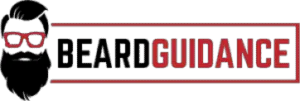Beard enthusiasts are ready to do a lot for the sake of acquiring that dream beard. Whether it’s by improving their diets, using various products, or even going for beard transplant surgery, they just want that full, glorious beard.
Today, we’re putting two products said to improve beard growth under the spotlight. We’ll be placing them head to head in a battle to figure out which one is better.
Biotin vs. minoxidil for beard growth: which is superior?
Between biotin and minoxidil, it’s hard to say that one of them is completely superior to the other. If we talk about results, though, minoxidil seems to have an edge over biotin when it comes to inducing beard growth.
Minoxidil is a bit better when it comes to hair growth, but it’s also far more expensive, can cause some side effects, and isn’t as easy to get as biotin.
A lot of research has been put into reaching that conclusion. Stay with us for some minutes to get the fruits of that research.
What Is Biotin?
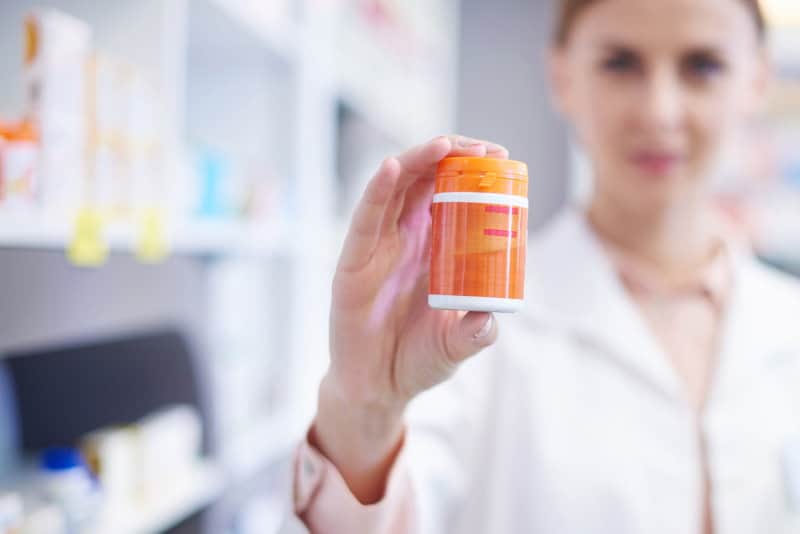
Biotin is a B complex vitamin (Vitamin B7) that helps the body to produce energy by metabolizing proteins, carbohydrates, and fats. It also plays a major role in keratin production, which is a protein found in our hair and skin.
The bacteria present in the intestines of human bodies can produce small amounts of biotin every day. Your own body, on the other hand, can’t synthesize biotin and needs more of it than the little amount produced by bacteria.
Can Biotin Help With Beard Growth?
The short answer is, yes it can. However, it’s not some sort of magical pill that will start working whenever you take it.
A study in 2017 found that using biotin supplements did help in hair growth for people who have hair growth problems. Since most hair loss problems affect the scalp first, the scope of the study wasn’t too focused on beard hair.
Still, this study proved that if you suffer from hair loss diseases like alopecia, for example, biotin will help your hair grow back.
On the other hand, only a limited number of studies were specific enough to see if biotin will affect beard hair growth in a healthy individual.
Other studies found that biotin promoted hair growth in people who previously had a biotin deficiency.
Now let’s recap and tone down our science class a little bit.
Biotin does help in forming keratin which is a major protein in our hair and skin. Science proved that it helps in hair growth for people who have certain diseases and also those who have a biotin deficiency.
Science hasn’t proved that biotin can promote beard growth in individuals who are completely healthy and yet, biotin is being sold as a hair growth supplement.
Let’s face it, none of us is 100% sure that our bodies are getting all the required minerals and supplements. If we were always consuming enough biotin, then any extra will be useless and there would be no need to get those supplements. That’s often not the case, though.
Based on how biotin deficiency leads to less hair and how consuming biotin helps with hair loss diseases, we concluded that biotin does indeed help with hair growth. It’s just not a breakthrough.
How to Get Biotin From Food
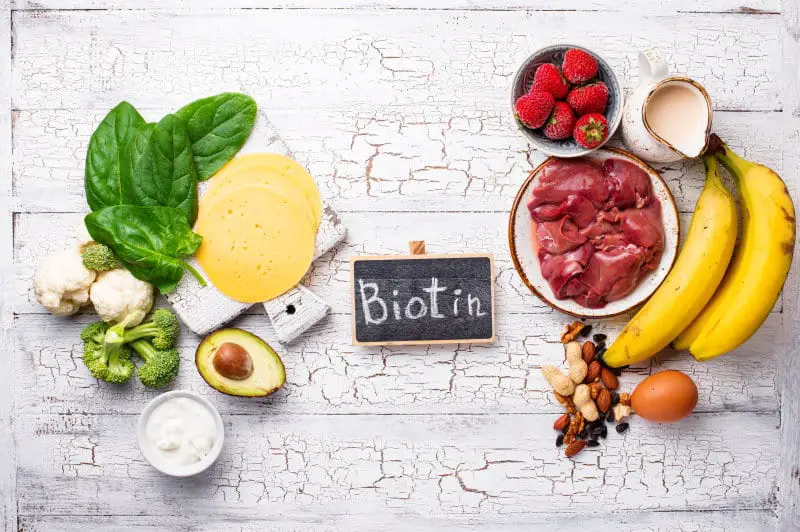
Supplements seem to be the most straightforward way for many people to get biotin. It’s strange how people often forget that biotin is also found in many foods that we can easily consume daily.
You can find biotin in:
- Eggs
- Beef
- Salmon
- Sweet potato
- Nuts
- Cow’s milk
- Cheese
- Cauliflower
- Spinach
Your body needs around 30 milligrams (mcg) of biotin daily. To give you an idea of how simple that is, a single boiled egg contains 10 mcg of biotin.
If you eat three eggs every day, your body will have its daily dose of biotin. That’s how easy it is.
Other Biotin Sources
Certain circumstances could force you away from getting your needed biotin from foods and supplements. You could be on a long boat trip, you could have no time to cook yourself a healthy meal… The reasons could go on and on!
Fortunately, biotin comes in two products that you’ve probably come across if you’re a beard enthusiast. Argan and Jojoba oils contain enough biotin to support your beard hair with its daily needs.
That’s right, our trusty beard oils always have our back. Many beard balms contain enough biotin to cover your needs as well. So there’s often no trouble getting some biotin at any given time.
Side Effects of Biotin
Biotin is a safe vitamin and having some excess of it in your body isn’t going to harm you in any way. Science is yet to prove some direct side effects of having extra biotin in your body.
The excess biotin, however, starts to cause problems when you need to perform certain lab tests.
The Thyroid hormone test is one of the tests that could yield false results if your body contains high levels of biotin.
Additionally, biotin can interfere with some medications like anticonvulsants.
If you need to perform certain tests or need to take some medications, it would be always wise to let the physician know that you take biotin supplements.
What Is Minoxidil?
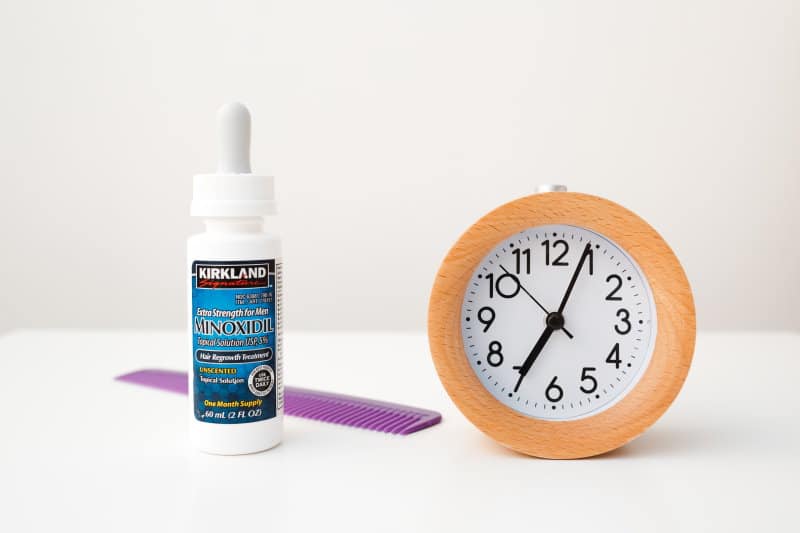
Minoxidil or “Rogaine” is an affordable over-the-counter liquid medicine that you can get from your local pharmacist.
Biotin works by forming a protein that goes into hair formation. Minoxidil, on the other hand, works a bit differently.
Time to get scientific again!
The hair starts to form inside your hair follicle by the means of protein-based cells. While biotin helps in the construction of these cells, minoxidil improves the blood circulation that reaches these cells.
Minoxidil’s main contribution here is vasodilatation. It widens the diameter of blood vessels which allows for more blood to go through. More blood going to the hair follicle means more nutrients and minerals. This ultimately means faster and better hair growth.
Can Minoxidil Help With Beard Growth?
We won’t give you a short answer this time because it’s quite relative to how you look at it. Allow us to explain.
Minoxidil does improve the blood supply coming to the hair follicle, which speeds up hair growth. However, this means “faster” not “fuller” hair growth.
Unless your blood supply is severely affected, the hair will still grow out of the follicle eventually, even if it takes a little longer because of bad blood supply.
On the other hand, because of the improved blood supply, the hair will become stronger and stay in its follicle longer. So, we can say that minoxidil is more of a hair maintainer than a hair growth inducer.
But what does science have to say about all of this?
Just like biotin, there are hardly any studies that target minoxidil’s effect on beard hair growth specifically. In fact, only one study directly tested that.
This study was published in the Journal of Dermatology in 2016 and it tested the effect of minoxidil against a placebo on beard growth.
The results were kind of promising. The group that used minoxidil showed a little improvement over the placebo-controlled group.
We won’t lie and say that it doesn’t look promising, but we also shouldn’t get ahead of ourselves and base long-term conclusions on a single study.
Another study in 2014 tested minoxidil against placebo but for eyebrow hair growth. The results this time were much more promising. However, eye hair and beard hair are considerably different.
We can still say that the minoxidil vasodilating effect did manage to help with hair growth. Maybe not too much with the beard hair but with good results on the eyebrow hair.
With the information we have now, we can safely say that minoxidil helps hair to grow. The effect on beard hair may not be remarkable but it’s still there.
How to Use Minoxidil
The minoxidil solution you get should contain 3% minoxidil. Any less than that may not give you the results you want.
Provided that you have the correct medicine, all you have to do is apply a small amount of the solution to your beard two times a day. You should do this daily for around 16 weeks.
As a man who started the beard journey a long time ago, you should already know what your beard looks like after 16 weeks.
Take some before and after photos while trying minoxidil for those 16 weeks. If there are actual results, your eyes should catch them.
Side Effects of Minoxidil
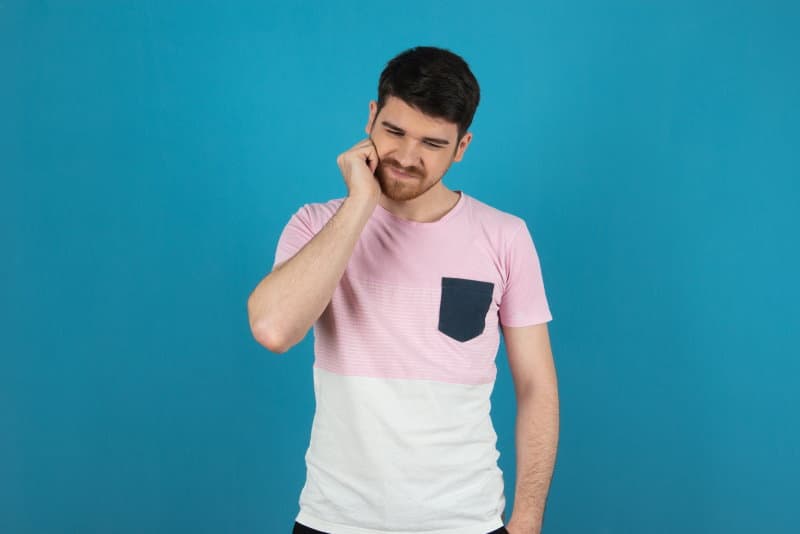
Before getting any deeper into the matter of side effects, you should know that every side effect we’re about to mention is uncommon and hardly happens.
That being said, minoxidil can cause some side effects when applied to your beard hair, these effects are:
- Facial skin redness and/or irritation
- Hair growth in accidental areas like the neck
- Change in the texture or color of hair (rare)
There are a few more side effects that are somewhat more severe, but they are much less likely to happen:
- Chest pain
- Dizziness
- Swollen hands and/or feet
- Abnormal weight loss
Biotin Vs Minoxidil: In a Nutshell
Now that we have a good background regarding both biotin and minoxidil. It’s time to place them face to face and see which one of them is superior.
Safety
Biotin doesn’t have serious side effects. It’s mostly just interacting with other medicines and changing the results of some laboratory tests.
On the other hand, although rare, minoxidil has a bigger list of side effects than biotin. So this bout goes to biotin.
Ease of Acquiring
Minoxidil can only be purchased as no food contains it. In fact, minoxidil can harm you if you swallow it in large amounts.
Biotin is safe to ingest and can be found in various types of food in addition to its availability as a supplement.
It’s a bit easier to get biotin to your beard than minoxidil, so this one goes to biotin.
Hair Growth
With the lack of focused studies to give us a scientific evidence-based answer, we’ve turned to the reviews of people who used both products for answers.
Most people reported better results with minoxidil than with biotin. However, the fact that you lose hair again after you stop using minoxidil is quite bothersome to most people.
Price
Because there are countless products based on both biotin and minoxidil, we can’t give you a fixed price as a base for comparison.
We did notice that minoxidil prices are on a considerably larger margin than biotin, though. Price-wise, biotin wins.
Can You Use Biotin and Minoxidil Together?
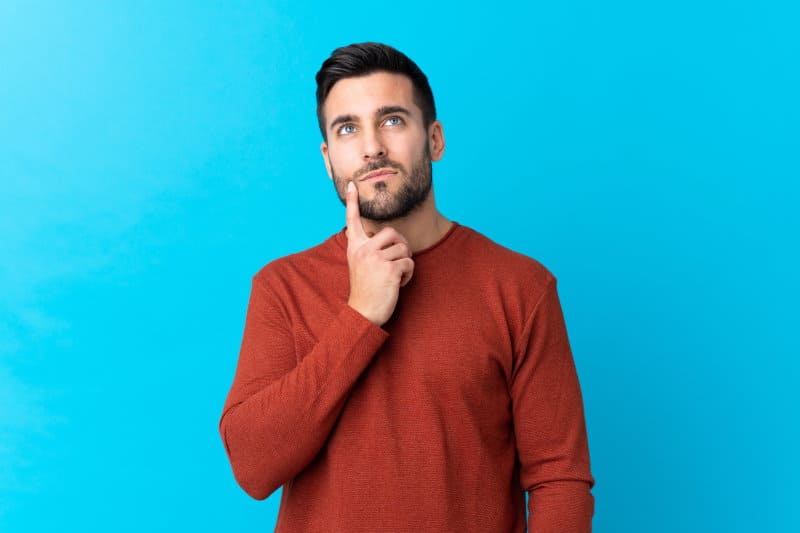
It’s generally considered safe to use biotin and minoxidil at the same time. It may hurt your wallet a little, but it won’t negatively affect your beard.
If you feel that your body is lacking biotin, you could consume some extra biotin from foods or just buy supplements.
If you had to give up one of them, it should be biotin. You can easily acquire biotin from your food every day.
Additionally, stopping minoxidil after you’ve made some progress presents a good chance of reversing that progress.
FAQs About Biotin
How much biotin should I take for hair growth?
According to people who use biotin supplements, a good daily dose is between 2 – 5 mcg. Along with the biotin you get from food, this should be enough to give you the hair growth effect you seek.
How long does it take biotin to work on hair?
The results may vary according to the type of biotin you consume. Generally, it takes 3 – 4 months for the results to become obvious.
What is the best time to take a biotin supplement?
The best time to take biotin is when your stomach is empty. That’s 1 hour before a meal or 2 hours after your last meal. To avoid the hassle, take it right after you wake up with a full glass of water.
Is it okay to take biotin every day?
Biotin supplements are safe up to doses of 300 mg daily. That’s if you take them by mouth. Biotin can also be found in cosmetic products with a percentage as low as 0.6%. Such cosmetic products are also safe for daily use.
Which biotin is best for hair growth?
The HealthKart Biotin 10000 mcg is arguably the best biotin product on the market right now. It’s known to promote hair growth and reduce nail brittleness.
Now that biotin has had its fair share, it’s time to introduce the rival, minoxidil.
FAQs About Minoxidil
Is minoxidil good for hair growth?
Minoxidil stimulates hair growth and slows down balding, especially for people under 40 years old. It should be noted that minoxidil will not cure baldness.
Can minoxidil regrow hair permanently?
Minoxidil will help you grow your hair but most of that hair will be lost when you stop using it. You should continue to use minoxidil if you want the new hair to stay there.
Is minoxidil worth using?
Minoxidil shows good results in 2 out of 3 men which means you have a good chance of seeing results. The results are more noticeable in people under 40 years old who have just started to lose hair recently.
Is it OK to use minoxidil on a wet beard?
It’s not harmful to apply minoxidil on a wet beard but if you want the best possible results, dry your beard completely first then use minoxidil.
Which minoxidil is best for hair growth?
10% Morr Minoxidil is currently one of the best types of minoxidil on the market for hair growth. It’s also advertised to treat hair thinning and reduce dryness.
Final Words
So, biotin vs minoxidil for beard growth: which is superior?
If we only look at the beard hair growth aspect of it, minoxidil will come on top. It just works better in supplying newly grown hairs and keeping the current ones healthy.
It would be an exaggeration to say that minoxidil is “superior,” though. Biotin is not an inferior product and it did yield good results. Those results may not be as good as minoxidil’s results but they’re still worth considering.
So to put this short, biotin has won our general comparison. It’s safer, more available, and cheaper. Minoxidil has won our hair growth battle. It’s marginally better than biotin but better is still better no matter how small it is.
If you’d like to know more about the hair loss condition known as alopecia, check out this article.
